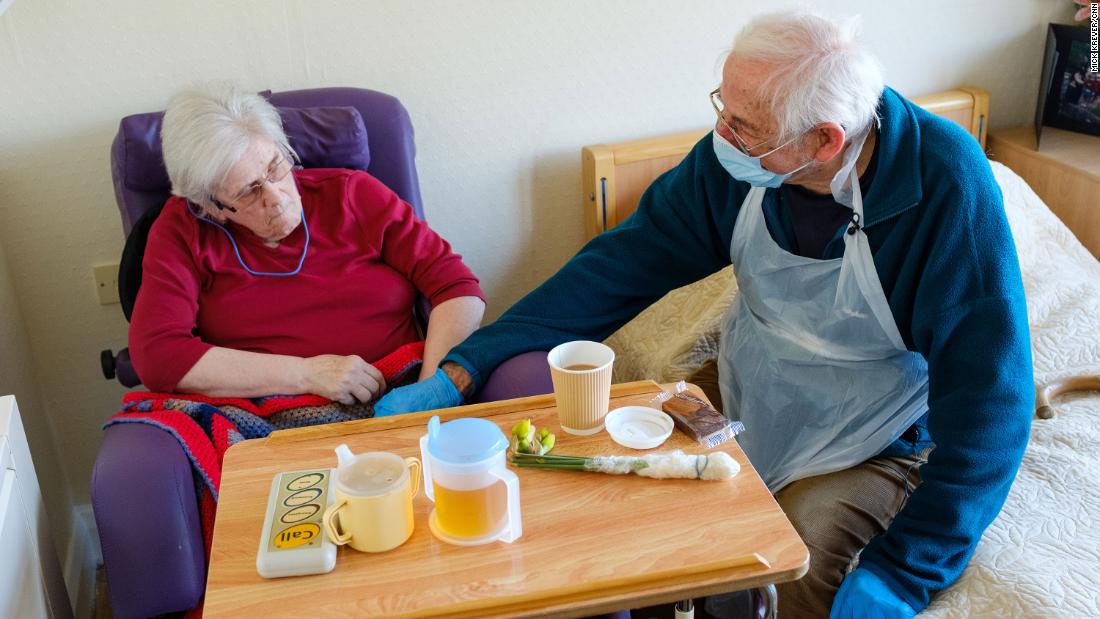“Hello, my dear,” he says. “Do you know who I am? I am David.”
Before he even puts his bags on the floor, David sits on Sheila’s bed, next to her armchair, and holds her hand – for the second time since the pandemic arrived in Britain.
The answer from Sheila, his wife for 55 years, is impossible to read. She has advanced dementia and rarely speaks.
“I haven’t seen you in a long time,” he tells her. “This is because of this Covid thing.”
During the pandemic, Sheila was isolated from everyone who loved her because Britain’s health and care homes remained virtually closed to visitors. Now, the launch of the vaccine in the UK has enabled an incremental but significant change. Each resident in England is entitled to a designated internal visitor.
CNN was given permission to observe some of the first moments when the people in its care met with their loved ones.
David gives daffodils from the garden to Sheila. He inspects her nails to see if they need to be trimmed. He tells her that his three children love her and miss her. Often, he just looks at her in silence while stroking her forearm with his gloved hand.
They met when they were both teachers at neighboring schools. Sheila is now 81 years old.
“She was always very sociable,” recalls David. “Outgoing, happy and fulfilled with home and family.”
David is pleased that there is no obvious decline in his condition, but says that he cannot know what she was thinking and feeling during the long time apart.
Visitors must record a negative Covid-19 test result immediately before entering the home and wearing personal protective equipment (PPE) during the visit. Hugs and kisses are prohibited.
David says that just being able to hold hands is already a big improvement to Sheila’s quality of life.
“One of the few ways she can show her feelings, really,” he says. “I think you have to be grateful for what you have.”
A town on Bexhill, in one of the many nursing homes along this stretch of England’s south coast, Renee Dolan, 86, looks forward to her granddaughter.
Suddenly Sara Agliata turns the corner and two big smiles light up the room.
“Nan! Ahhh!” cries Sara.
“Oh, thank you, dear,” says Renée, receiving a bouquet of flowers. “You had to come with all that plastic.”
“I know, I know,” Sara laughs. “You can hear me coming.”
His grandmother grabs his hand tightly. With the other, she kisses him on the cheek.
“Oh, you are not allowed to kiss me,” Sara says softly.
For the next half hour, their hands remain joined, and lively conversation flows from the great-grandchildren to Harry and Meghan’s recent interview.
Sometimes, Renée is overwhelmed with emotion and struggles to explain how important this moment is. “It’s so good to see you. [been] a long time, “she says, sobbing.
The granddaughter says: “I’ll be back next week too”.
Renee’s husband died at the age of 47. She spent decades living alone in central London and is now suffering from early dementia.
“She is an extremely independent person who loves her family and enjoys being around her,” says Sara. “She likes to be around people.”
Renee is grateful for the comfort of holding hands – “it means everything to me, everything” – but she waits for more.
“It is a pity that we are not yet able to embrace,” she says. “But it won’t be long, will it?”
Outside the Manor Hall nursing home in Eastbourne, a group of residents is slowly but enthusiastically getting into a minibus. It is the first time that they have been allowed to leave the building and its small courtyard since last summer.
The tour begins with a tour of the green, rolling hills of South Downs National Park.
“We waited a long time for this, didn’t we? Beautiful,” says George Baulch, 87, smiling through the window.
The bus soon stops in a public garden by the sea. Residents go to the banks. His caregivers distribute blankets, cups of tea and snacks.
There are smiles, laughter and many complaints about the cold of early spring. Someone makes a spicy joke the size of a banana. This is the greatest freedom that they have experienced in a long time.
“You get here and realize how big England is,” says George with a laugh.
The elderly sacrificed more freedoms than most during the pandemic, and more than half of Covid-19’s deaths in England and Wales last year were from people over 80. They were prioritized in the launch of the vaccine in the UK from December and the first doses have already been administered to 99.9% of nursing homes and nursing homes in England, according to the country’s National Health Service.
About 23 million people in total across the UK have already received their first vaccine injection. This protection is allowing modest changes, the possibility of hope and glimpses of a post-Covid future.
“We’ve been in jail for weeks and weeks and weeks,” says George. “[I] I never thought it would happen again for us. And now we are here. “
CNN’s Darren Bull and Matt Brealey contributed to this report.
